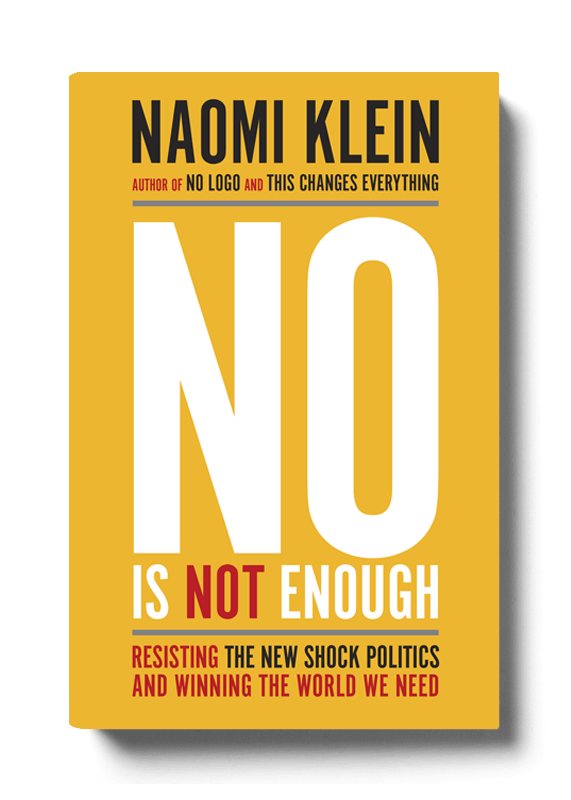On my journey to school recently I've added some audiobooks to my playlists, in addition to the various podcasts I am already subscribed to (Radiolab, The Drama Teacher Podcast, Flash Forward, Under The Skin, to suggest a few). It's a great way to digest some content while otherwise doing basically nothing and I've been able to encounter some great new ideas this way.
The best thing I've listened to recently is an audiobook version of Naomi Klein's No Is Not Enough: Resisting Trump's Shock Politics and Winning The World We Need. In the book, Klein outlines some of the key factors that created social and political systems which Trump (and other global leaders) has been able to exploit while at the same time undermine so thoroughly. She then goes on to urge everyone who is currently fighting independently for any particular group's rights, or our planet's protection, to unite with a shared and common purpose.
“The crucial lesson of Brexit and of Trump’s victory, is that leaders who are seen as representing the failed neoliberal status quo are no match for the demagogues and neo-fascists. Only a bold and genuinely redistributive progressive agenda can offer real answers to inequality and the crises in democracy, while directing popular rage where it belongs: at those who have benefited so extravagantly from the auctioning off of public wealth; the polluting of land, air, and water; and the deregulation of the financial sphere.”
― Naomi Klein, No Is Not Enough: Resisting Trump's Shock Politics and Winning the World We Need
This book, which ties into many of the same messages in the podcasts I have been listening to since Trump's election and Brexit, has given me much food for thought and I've been reflecting on what I can start doing in my classroom and, not forgetting, personal life.
It is imperative that our students understand the need for a "genuinely redistributive progressive agenda" and as privileged, well-educated, young citizens of the world they have the responsibility and opportunity to offer positive alternatives to the current systems of power and wealth. As a drama teacher, I have always believed in collaborative methods of making work, but now even more I think we need to move further away from hierarchical, top-down methods of creating art. Traditional author > director > actor > crew hierarchies can be problematic; we need to use more egalitarian collaborative strategies as models and testing grounds for how our students can practise embodying these ideas once they become young professionals, policy makers, leaders and visionaries in the future.
What are some of the ways this can look in practice? Directive-Response-Response, is a method of making art collectively, which provides an alternative to director-lead work. I believe it is also important to offer alternatives to the unidimensional narratives of most popular culture towards complex, multilayered, even potentially contradictory or confusing representations of real life. The most popular products of the West End, Broadway, Hollywood and television, though often compelling stories, many of which even with positive, progressive messages, do very little to incite real change in the world. Developing 'moment work' as Tectonic Theatre Project has been doing for many years, is a great way to build multi-layered work, which can encapsulate a much broader range of views and ideas.
"[...] Any opposition that is serious about taking on Trump, or other far-right forces like him around the world, must embrace the task of telling a new history of how we ended up here, in this perilous moment . A history that compellingly shows the role played by the politics of division and separation. Racial divisions. Class divisions. Gender divisions. Citizenship divisions. And a false division between humans and the natural world. Only then will it become possible to truly come together to win the world we need."
― Naomi Klein, No Is Not Enough: Resisting Trump's Shock Politics and Winning the World We Need
We should also think beyond the constraints of just making performance work though. I have been reflecting on the way students reflect and give feedback to each other during the creative process.
Liz Lerman's Critical Response Format is a detailed and structured way for artists to receive feedback, which I've used previously with success, but even something as simple as employing Think-Pair-Share in my classroom has increased overall collaboration and engagement.
Beyond this, I think the single biggest thing we can do in our classrooms is encourage students to use their imaginations. To imagine new worlds, new possibilities; ones vastly different from what currently exists.
"With unleashed white supremacy and misogyny, with the world teetering on the edge of ecological collapse, with the very last vestiges of the public sphere set to be devoured by capital, it's clear that we need to draw a line in the sand and say "no more." Yes, we need to do that and we need to chart a credible and inspiring path to a different future. And that future cannot simply be where we were before Trump came along (aka the world that gave us Trump). It has to be somewhere we've never been before."
― Naomi Klein, No Is Not Enough: Resisting Trump's Shock Politics and Winning the World We Need
Or as Douglas Adams wrote, "Let us think the unthinkable, let us do the undoable, let us prepare to grapple with the ineffable itself, and see if we may not eff it after all."
The reimagining of classics with minor updates, the regurgitating of the same canon of playtexts, the 'tried and true' formulas of making theatre, these are no longer enough if we want to fix the most pressing problems of our world. What we need is something else, something new, a format beyond what is currently offered in the mainstream cinemas and theatres of the world. And who better to build this kind of theatre but our young people, still able to imagine and play, who's future is still very much ahead of them.




















